Why Are Recruiters Being Ghosted By Candidates?
Updated : 4 months ago
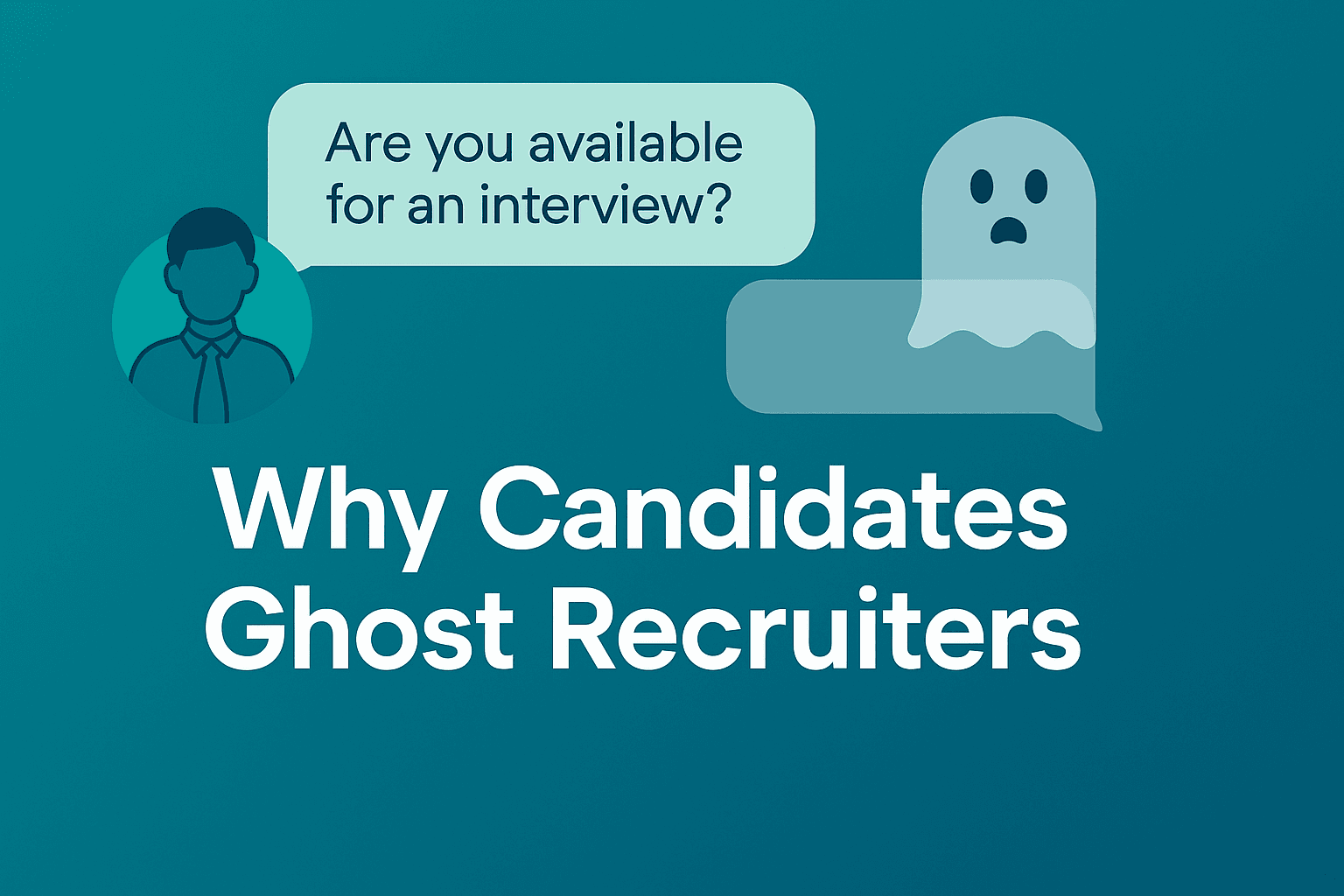 A survey shows that ghosting isn’t just an employer problem. Today, most of the job seekers do it, too. In the past year, about 61% of U.S. job seekers admitted to ghosting two to four employers. The numbers are lower in other countries. Like -
A survey shows that ghosting isn’t just an employer problem. Today, most of the job seekers do it, too. In the past year, about 61% of U.S. job seekers admitted to ghosting two to four employers. The numbers are lower in other countries. Like -
- 37% in Canada and
- 36% in the U.K.
But how do job seekers actually feel about ghosting? The survey revealed some surprising answers:
- 70% of U.S. job seekers believe ghosting an employer is “fair.”
- 59% regret doing it afterward.
- 23% said ghosting made them feel more in control.
What’s even more surprising is how many are willing to do it again. In 2023, 62% of job seekers said they plan to ghost in future job hunts. The number was 56% in 2022 compared to only 37% in 2019. The big question is: why is this trend growing so fast?
How Employers See Ghosting?
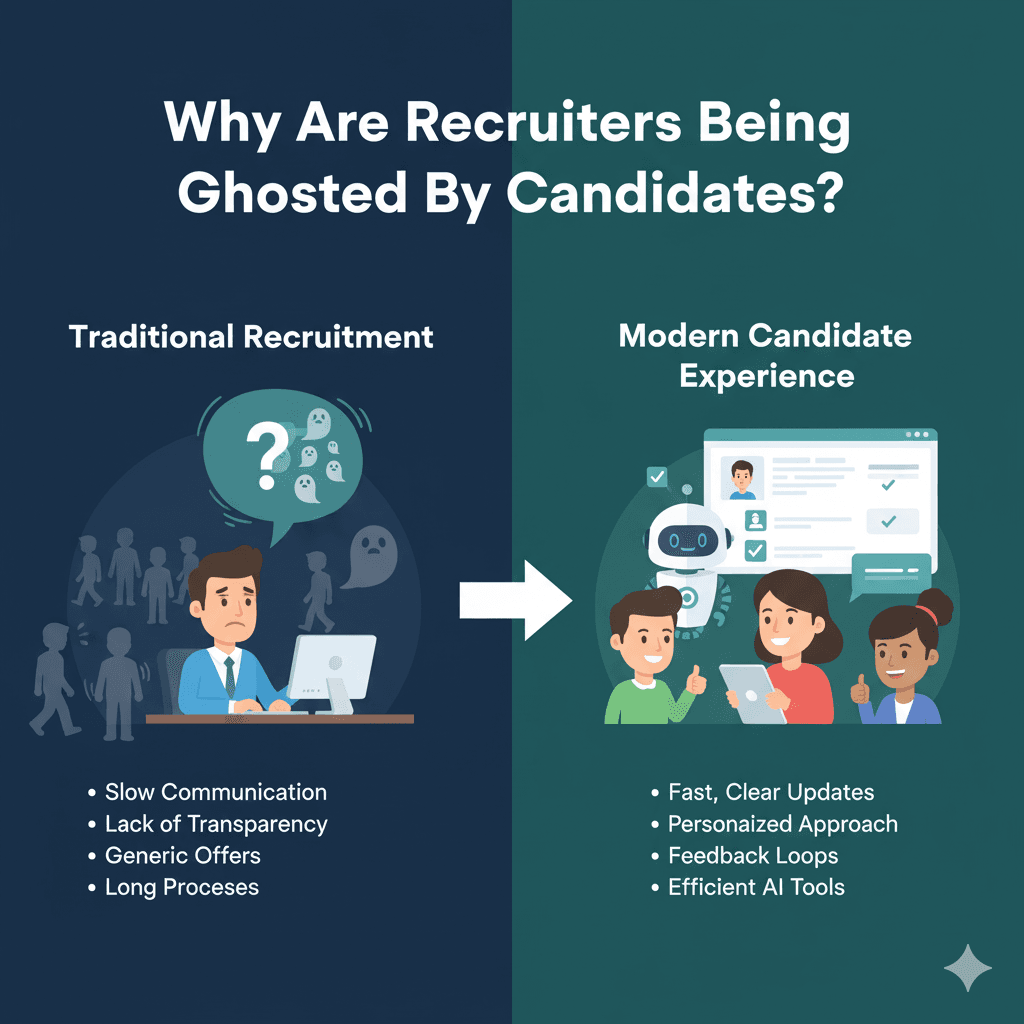 Ghosting might sometimes feel like a win for job seekers. However, it creates big problems for employers. In an Indeed survey, 89% of employers said ghosting is an issue. The issue is with candidates suddenly dropping out of the process or not showing up on day one.
Ghosting might sometimes feel like a win for job seekers. However, it creates big problems for employers. In an Indeed survey, 89% of employers said ghosting is an issue. The issue is with candidates suddenly dropping out of the process or not showing up on day one.
Why is it such a headache?
- The time spent on a candidate could have been used more productively.
- The recruiters turn away other strong applicants.
- Some managers already start planning onboarding.
- Ghosting puts extra pressure on recruiting and hiring teams.
- The announcement of a new hire to the wider company.
And here’s the twist: many employers don’t just “forget and move on.” 62% of U.S. employers actually track candidates who ghost.
So, if you ghost a big company’s recruiter, there’s a good chance they’ve made a note of it. There is a possibility they might hurt your chances if you apply there again.
Why Do People Ghost?
Job seekers don’t always ghost for the reasons that employers have in their minds. What employers believe:
According to U.S. employers, the top five reasons candidates ghost are:
- They got another job offer.
- The job wasn’t a good fit.
- They felt awkward about telling the recruiter “no.”
- They didn’t know how to back out of the process.
- The pay was too low.
What do job seekers actually say?
Job seekers have different thoughts -
- The job wasn’t a good fit.
- The company wasn’t a good fit.
- The pay wasn’t enough.
- The benefits weren’t good enough.
- They got another job offer.
Only 23% said communication issues with recruiters were a reason for ghosting.
And what about employers ghosting candidates?
That’s still a mystery. But some likely reasons include:
- Moving forward with another candidate.
- Filling the role internally.
- Hiring freezes.
Simple mistakes include missed emails, emergencies, sick leave, or things falling through the cracks.
How Recruiters Can Reduce Candidate Ghosting?
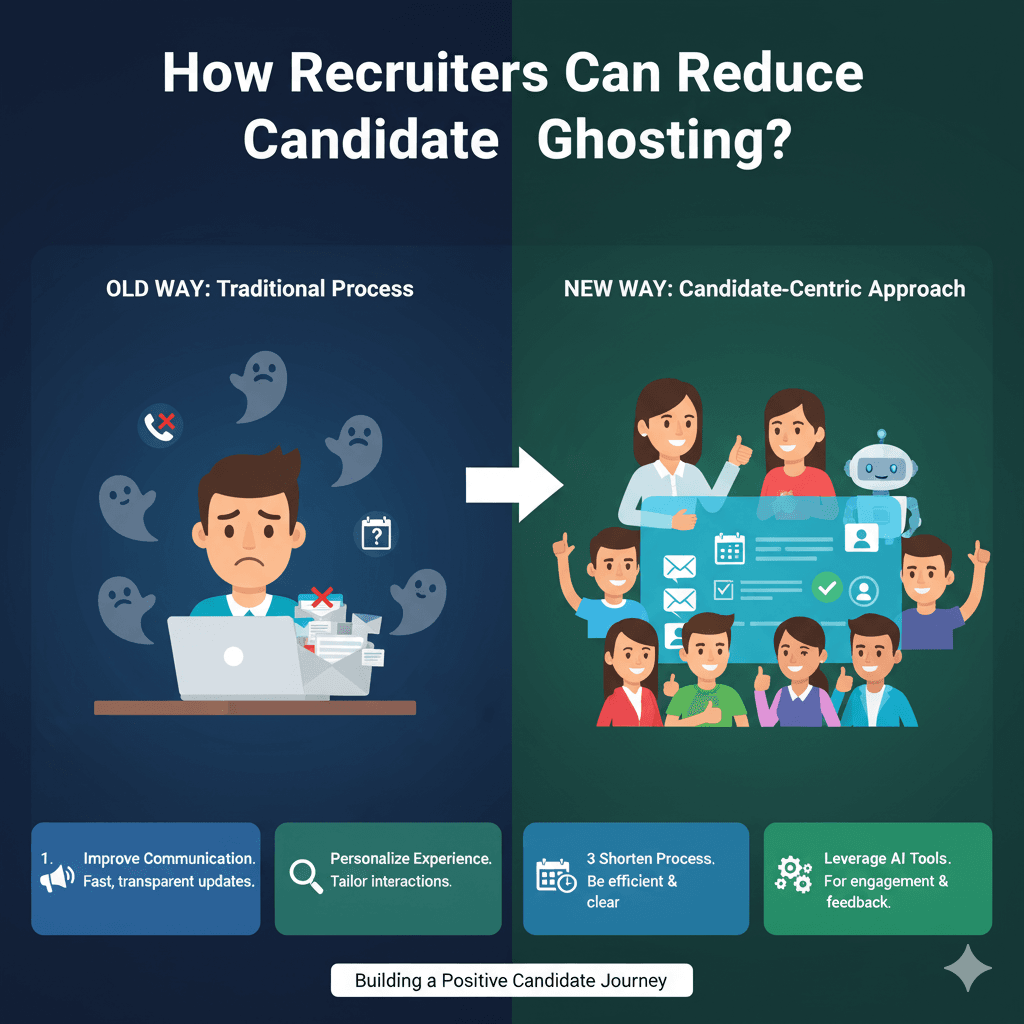 Ghosting isn’t always unavoidable, but recruiters can take steps to reduce it and build stronger relationships with candidates. Here are some effective strategies:
Ghosting isn’t always unavoidable, but recruiters can take steps to reduce it and build stronger relationships with candidates. Here are some effective strategies:
Hire for the right stage of your company
Don’t just chase big-name talent. You need to focus on whether the candidate fits your company’s current stage and needs.
Give candidates with respect
Make interviews comfortable and conversational. Show genuine interest in their background and career goals.
Be punctual
The interviewers should show up on time. If you are making candidates wait, it leaves a poor impression.
Check interview quality
Gather some feedback from candidates after interviews. Sometimes there’s a mismatch between the job description and what’s actually being asked.
Train your recruiters
Roles keep evolving. It usually happens in technical fields. Make sure recruiters understand the skills and terminology so candidates feel respected.
Spot early warning signs
If a candidate seems disengaged or is “interview shopping,” you need to address it with an open conversation. Or, you can think about moving on quickly.
Strengthen your talent brand
It is important to know that companies with a strong reputation and good candidate experience face less ghosting. You need to build trust so talent seeks you out.
Give honest feedback
Don’t ever try to hide behind generic replies like “we went with another candidate.” Be bold and offer constructive feedback so candidates feel valued.
Keep communication open
A lot of ghosting happens due to slow or broken communication. You need to fix bottlenecks in your hiring process.
Keep The Process Short And Valuable
Avoid long, bureaucratic hiring processes that have endless rounds. Candidates won’t wait months unless you’re a major brand.
Assignments Should Be Fair
If you need case studies, proposals, or technical projects, make sure the workload is reasonable. If it’s a heavy assignment, consider compensation. Or at least clarify that their work won’t be used by the company.
How to Avoid Candidate Ghosting?
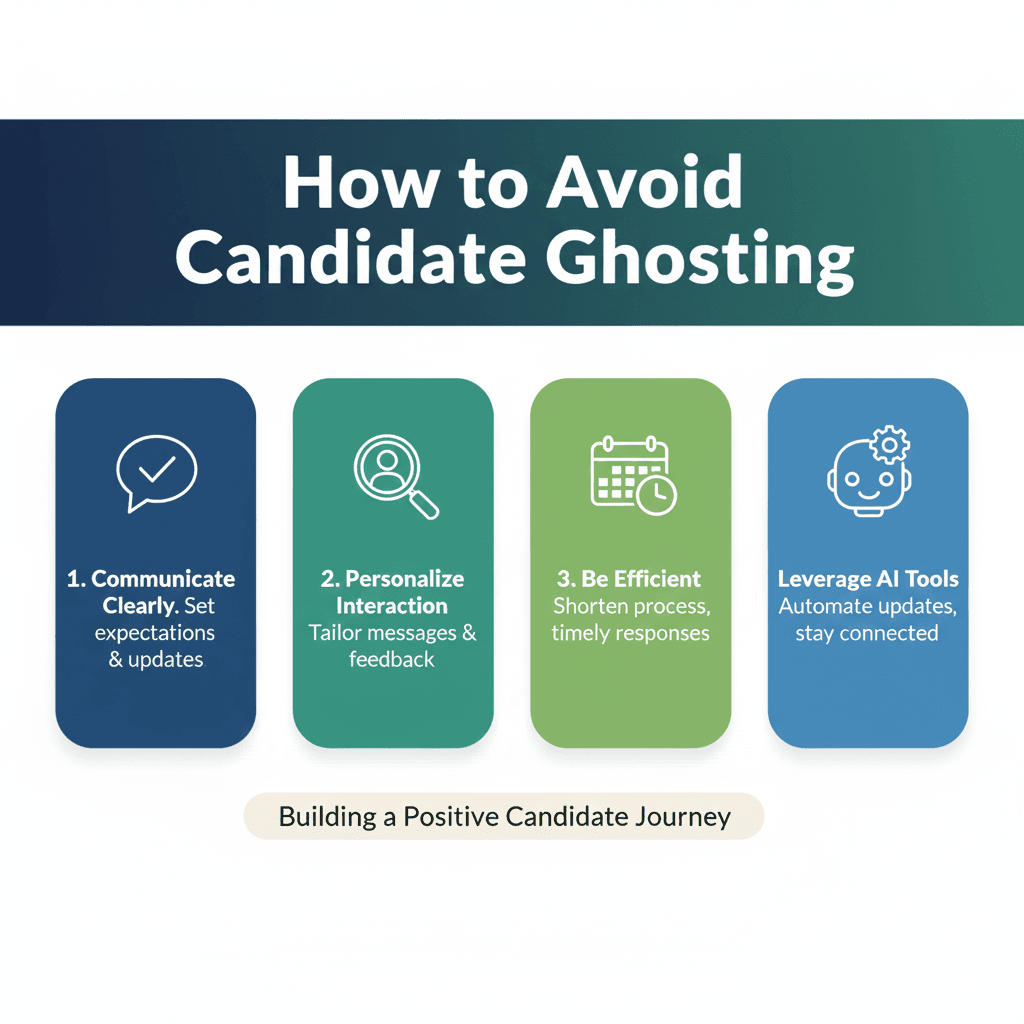 It’s not possible to eliminate ghosting. However, you can take steps to make it less likely. Here are 10 ways to reduce candidate ghosting -
It’s not possible to eliminate ghosting. However, you can take steps to make it less likely. Here are 10 ways to reduce candidate ghosting -
1. Optimize the Application Process
Don’t pressurize candidates with endless questions. Keep your application short and focused on the essentials. Candidates don’t like long, complicated forms, but those can increase drop-offs.
2. Stagger Information Collection
Ask for details in stages. For example, save requests like references or recommendation letters for later rounds instead of asking upfront. It can make the process less heavy for candidates in the early stages.
3. Automate Interview Scheduling
Use recruitment automation tools to let candidates self-schedule interviews. It removes back-and-forth communication and makes scheduling quick and convenient.
4. Minimize Interview Lag Time
Long gaps between interviews can cause candidates to lose interest. If a hiring manager isn’t available, involve another team member. You can dedicate specific days for interviews to keep the process moving.
5. Maintain Ongoing Communication
Keep candidates in the loop with updates and reminders. Send them the confirmation emails, share timelines, and follow up regularly.
Automated workflows and CRMs can help ensure no one falls through the cracks.
6. Prioritize Candidate Experience
64% of candidates prefer to stay in touch with a recruiter after a positive experience. It happens even if they don't get the job.
You need to be transparent and answer questions quickly. Most importantly, give insights into the role, team, and company culture to build trust and excitement.
7. Treat Candidates Like Customers
Personalize your communication. You need to -
- show genuine interest in their goals,
- send thoughtful messages, and
- gather feedback with surveys.
Candidates who feel valued are less likely to ghost.
8. Start Pre-boarding Early
Once an offer is made, don’t go silent. You can -
- introduce candidates to their future team,
- share company updates, or
- Invite them to events.
Early engagement makes them feel included and reduces the risk of no-shows.
9. Learn From Drop-Offs
When ghosting happens, use it as feedback. You can compare drop-off rates with similar roles or run surveys.
Check if the job description, pay, or process needs adjustments. Further, you need to identify negative experiences and fix them.
What to Do When a Candidate Ghosts You?
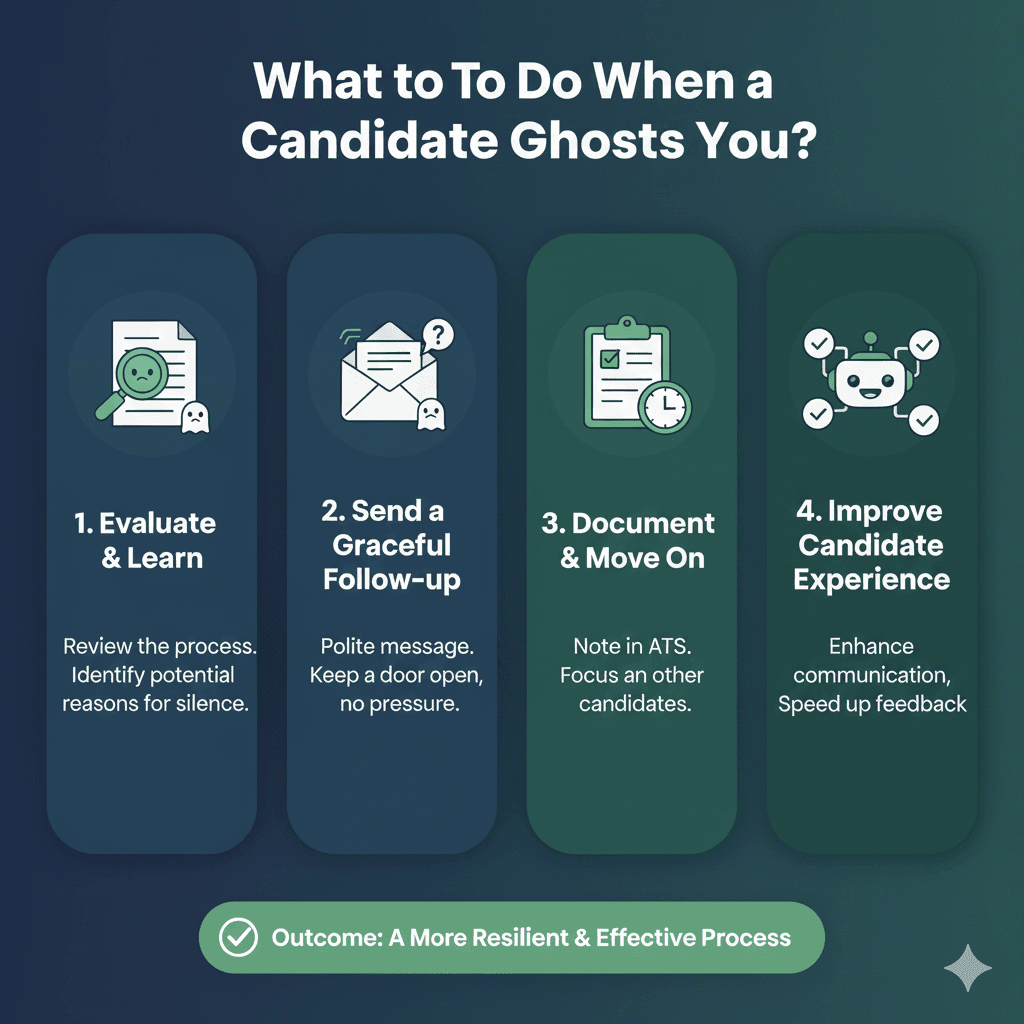
1. Follow Up Through Different Channels
If a candidate goes quiet, don’t assume they’re gone right away. Send a polite follow-up email to check in. You can ask if they need anything else from you.
If there’s no response within 24–48 hours, try another method -
- text,
- phone call, or
- even a LinkedIn message.
Sometimes candidates genuinely miss emails due to spam filters or busy schedules. So, you need to use different ways to respond. It can increase your chances of reconnecting.
2. Be Patient Before Making Decisions
It’s normal to feel disappointed and immediately withdraw an offer. Further, you even think about not considering the candidate when they don’t reply.
However, ghosting isn’t always intentional. They might just be caught up with personal issues or other interviews.
You should wait a couple of days before taking any action. If they remain unresponsive even after follow-ups, then it’s fair to move forward without them.
3. Keep Records of All Communication
Document every interaction with the candidate. It includes -
- emails,
- texts, and
- interview notes.
It helps in two ways:
- If they apply again in the future, you’ll know whether they ghosted before.
- It provides a clear record in case you need to explain decisions internally to your team.
Keeping a candidate history ensures you make informed hiring choices in the future.
4. Review and Improve Your Hiring Process
If ghosting happens too often, you need to learn what’s wrong in your process and what needs fixing. Candidates drop off when the hiring process is too long and unclear. You need to take time to check your process and ask yourself:
- Are your job postings clear, interesting, and engaging?
- Do candidates know about the position?
- Are you scheduling the interviews promptly?
- Are your job interviews free from unnecessary rounds?
- Is your communication open and respectful throughout?
5. Offer Incentives to Stay Engaged
Motivate candidates to stick around. You can consider small incentives for those who complete your process.
It includes referral bonuses, early joining perks, or even long-term growth opportunities within the company.
Keep in mind that incentives alone won’t eliminate ghosting. They show candidates that you value their time and effort. It makes them less likely to walk away.
Finally….
Ghosting is not going anywhere in the hiring process. However, it doesn’t mean you can look away from your hiring efforts. Candidates ghost for many reasons. There can be poor communication or mismatched expectations.
When it comes to the recruiters, they face the real costs of wasted time and delayed hires.
The good news? With the right strategy and aligned process, you can reduce ghosting. It builds stronger connections with talent.
Think of every candidate interaction as an opportunity to strengthen your employer brand. Even when someone drops off, learn the way you handle it. There can be an impression that could influence future applications.
Frequently Asked Questions
1. What are some of the reasons that candidates ghost recruiters?
Candidates often ghost because they receive a better offer. They feel the role isn’t a good fit, dislike the hiring process, or simply feel uncomfortable rejecting the employer directly.
2. Is ghosting common in recruitment?
Yes. Surveys show that over 60% of job seekers in the U.S. have ghosted employers in the past year.
3. How can recruiters reduce candidate ghosting?
They need to keep communication clear, shorten hiring timelines, and provide respectful interview experiences.

